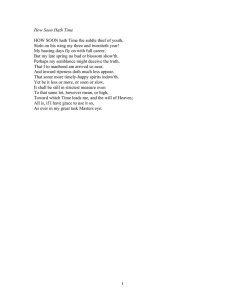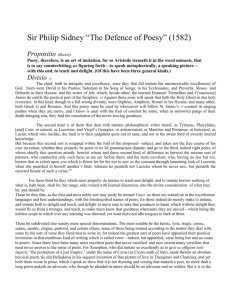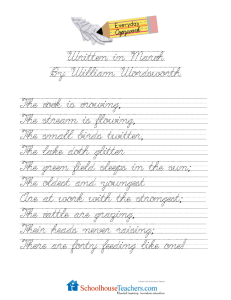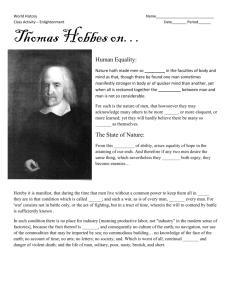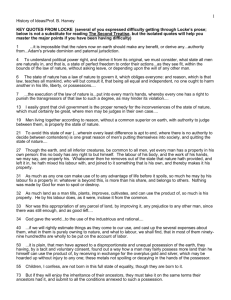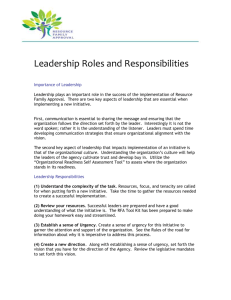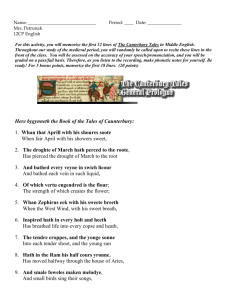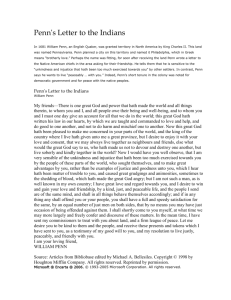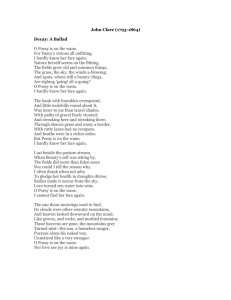Excerpt from Sir Philip Sidney`s Defence of Poesy.
advertisement
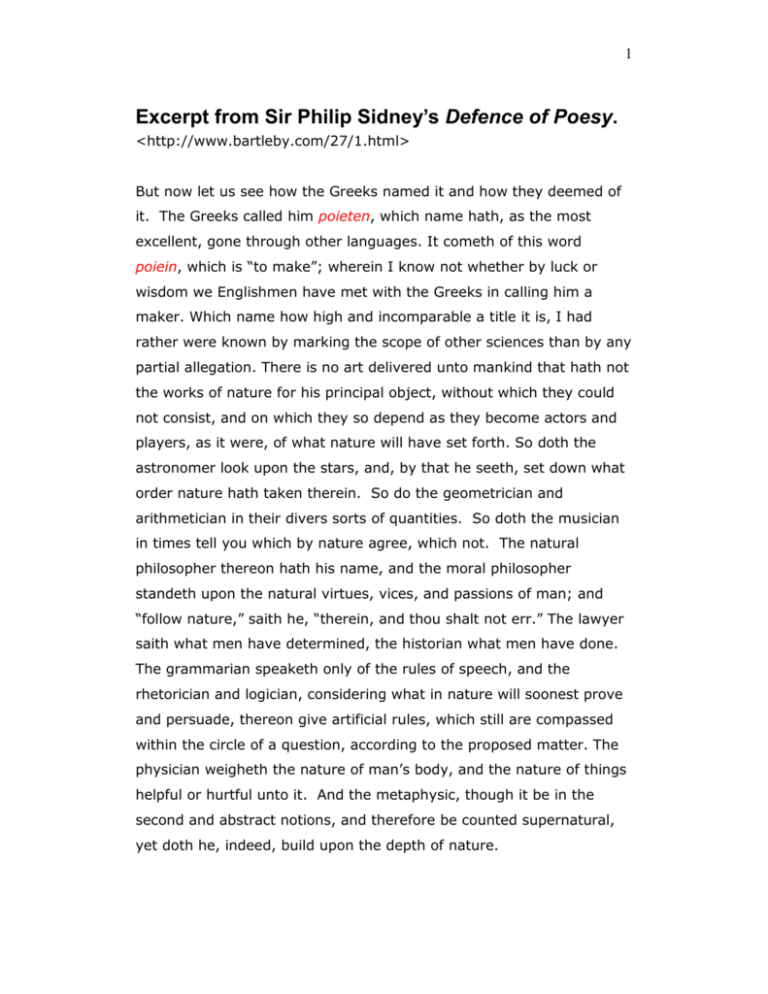
1 Excerpt from Sir Philip Sidney’s Defence of Poesy. <http://www.bartleby.com/27/1.html> But now let us see how the Greeks named it and how they deemed of it. The Greeks called him poieten, which name hath, as the most excellent, gone through other languages. It cometh of this word poiein, which is “to make”; wherein I know not whether by luck or wisdom we Englishmen have met with the Greeks in calling him a maker. Which name how high and incomparable a title it is, I had rather were known by marking the scope of other sciences than by any partial allegation. There is no art delivered unto mankind that hath not the works of nature for his principal object, without which they could not consist, and on which they so depend as they become actors and players, as it were, of what nature will have set forth. So doth the astronomer look upon the stars, and, by that he seeth, set down what order nature hath taken therein. So do the geometrician and arithmetician in their divers sorts of quantities. So doth the musician in times tell you which by nature agree, which not. The natural philosopher thereon hath his name, and the moral philosopher standeth upon the natural virtues, vices, and passions of man; and “follow nature,” saith he, “therein, and thou shalt not err.” The lawyer saith what men have determined, the historian what men have done. The grammarian speaketh only of the rules of speech, and the rhetorician and logician, considering what in nature will soonest prove and persuade, thereon give artificial rules, which still are compassed within the circle of a question, according to the proposed matter. The physician weigheth the nature of man’s body, and the nature of things helpful or hurtful unto it. And the metaphysic, though it be in the second and abstract notions, and therefore be counted supernatural, yet doth he, indeed, build upon the depth of nature. 2 Only the poet, disdaining to be tied to any such subjection, lifted up with the vigor of his own invention, doth grow, in effect, into another nature, in making things either better than nature bringeth forth, or, quite anew, forms such as never were in nature, as the heroes, demigods, cyclops, chimeras, furies, and such like; so as he goeth hand in hand with nature, not enclosed within the narrow warrant of her gifts, but freely ranging within the zodiac of his own wit. Nature never set forth the earth in so rich tapestry as divers poets have done; neither with pleasant rivers, fruitful trees, sweet-smelling flowers, nor whatsoever else may make the too-much-loved earth more lovely; her world is brazen, the poets only deliver a golden. …. [snip] Poesy, therefore, is an art of imitation; for so Aristotle termeth it in the word mimesis; that is to say, a representing, counterfeiting, or figuring forth: to speak metaphorically, a speaking picture, with this end, to teach and delight. Of this have been three general kinds: the CHIEF, both in antiquity and excellency, which they that did imitate the inconceivable excellencies of God; such were David in the Psalms; Solomon in the Song of Songs, in his Ecclesiastes, and Proverbs; Moses and Deborah in their hymns; and the writer of Job; which, beside others, the learned Emanuel Tremellius and Fr. Junius do entitle the poetical part of the scripture; against these none will speak that hath the Holy Ghost in due holy reverence. In this kind, though in a wrong divinity, were Orpheus, Amphion, Homer in his hymns, and many others, both Greeks and Romans. And this poesy must be used by whosoever will follow St. Paul's counsel, in singing psalms when they are merry; and I know is used with the fruit of comfort by some, when, in sorrowful 3 pangs of their death-bringing sins, they find the consolation of the never-leaving goodness. The SECOND kind is of them that deal with matter philosophical; either moral, as Tyrtaeus, Phocylides, Cato, or, natural, as Lucretius, Virgil's Georgics; or astronomical, as Manilius and Pontanus; or historical, as Lucan; which who mislike, the fault is in their judgment, quite out of taste, and not in the sweet food of sweetly uttered knowledge. But because this second sort is wrapped within the fold of the proposed subject, and takes not the free course of his own invention; whether they properly be poets or no, let grammarians dispute, and go to the THIRD, indeed right poets, of whom chiefly this question ariseth; betwixt whom and these second is such a kind of difference, as betwixt the meaner sort of painters, who counterfeit only such faces as are set before them; and the more excellent, who having no law but wit, bestow that in colours upon you which is fittest for the eye to see; as the constant, though lamenting look of Lucretia, when she punished in herself another's fault; wherein he painteth not Lucretia, whom he never saw, but painteth the outward beauty of such a virtue. For these three be they which most properly do imitate to teach and delight; and to imitate, borrow nothing of what is, hath been, or shall be; but range only, reined with learned discretion, into the divine consideration of what may be, and should be. These be they, that, as the first and most noble sort, may justly be termed "vates;" so these are waited on in the excellentest languages and best understandings, with the fore-described name of poets. For these, indeed, do merely make to imitate, and imitate both to delight and teach, and delight to move men to take that goodness in hand, which, without delight they would fly as from a stranger; and teach to make them know that goodness whereunto they are moved; which being the noblest scope 4 to which ever any learning was directed, yet want there not idle tongues to bark at them. This purifying of wit, this enriching of memory, enabling of judgment, and enlarging of conceit, which commonly we call “learning,” under whatever name it come forth, or to whatever immediate end it be directed, the final end is to lead and draw us to as high a perfection, as our degenerate souls, made worse by their clay-lodgings, can be capable of. This according to the inclination of man, bred many formed impressions. For some that thought this felicity principally to be gotten by knowledge, and no knowledge to be so high or heavenly, as acquaintance with the stars; gave themselves to Astronomy: others persuading themselves to be Demigods, if they knew the causes of things, became natural and supernatural Philosophers. Some an admirable delight drew to Music; and some the certainty of demonstration to the Mathematics: but all one and other having scope to know, and by knowledge to lift up the mind from the dungeon of the body, to the enjoying his own divine essence.
